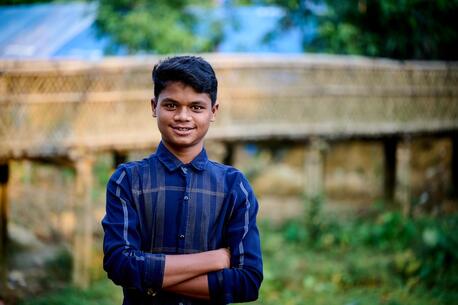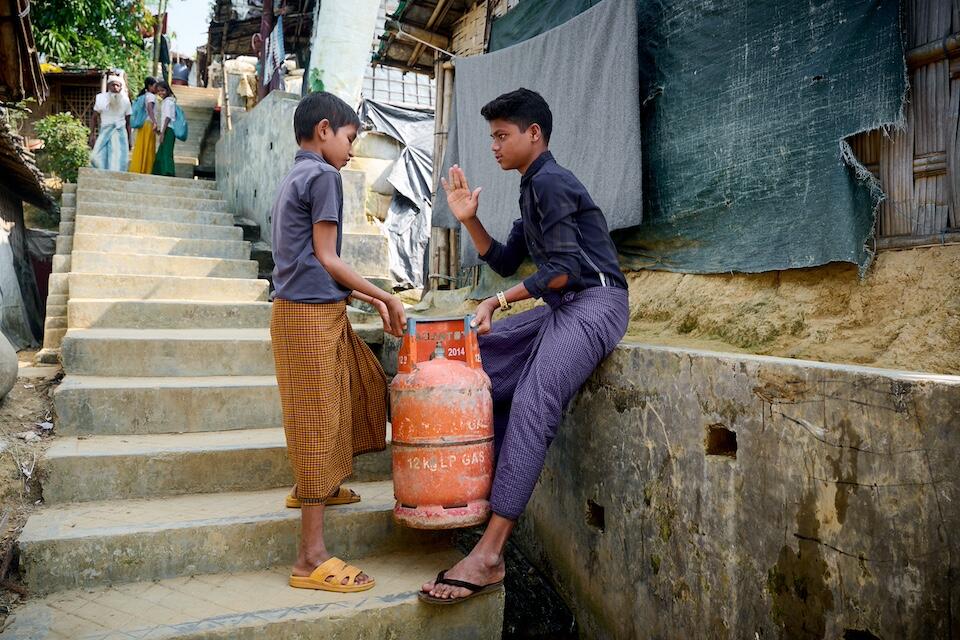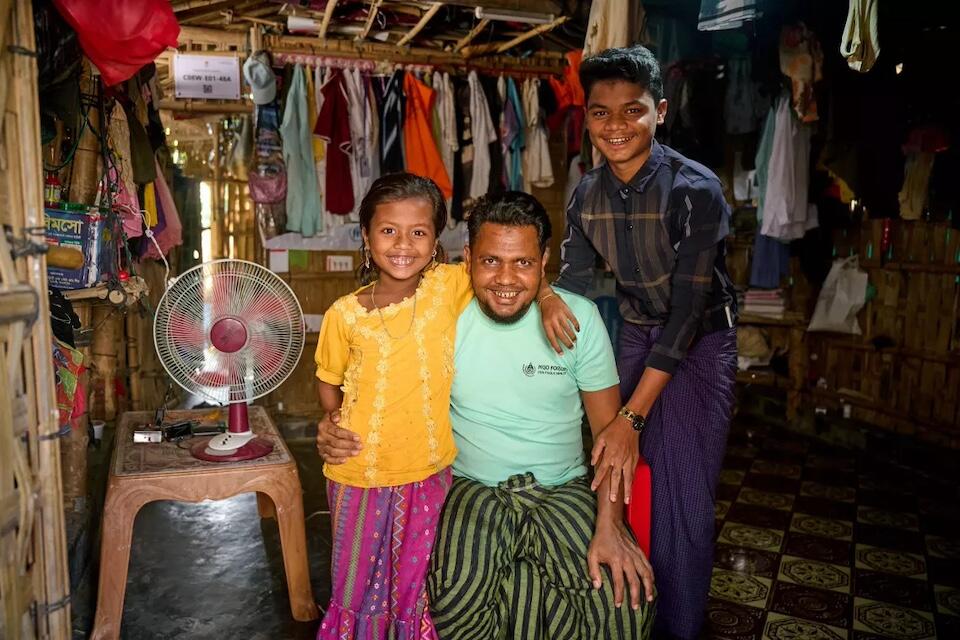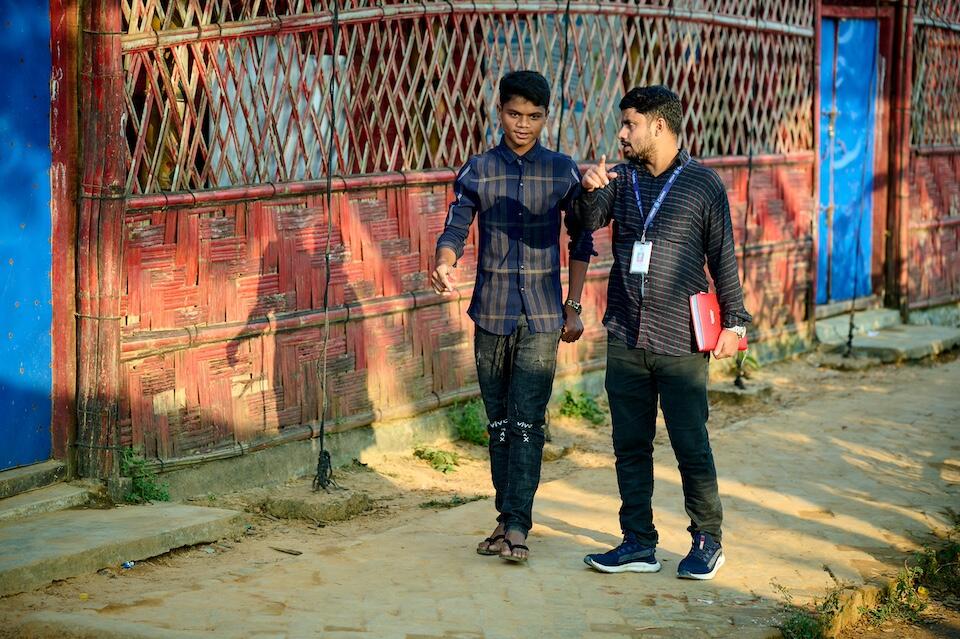
From Bystander to Change Maker: Anayet's Journey as an Adolescent Peer Leader
At age 9, Anayet, a Rohingya refugee from Myanmar living in the refugee camps in Cox's Bazar, Bangladesh, was doing hard labor instead of going to school and making friends. By age 13, he was changing lives as an adolescent peer leader, recognizing — and helping to put a stop to — multiple child rights violations, after receiving life skills training and other services at a UNICEF-supported multi-purpose center. This is his story.
When economic hardship compels families to send children to work
When Anayet first set foot in the Rohingya refugee camps in Cox’s Bazar, the struggle was immediate. Only 9, he was tasked with the daily, demanding ritual of gathering firewood and water for makeshift cooking for his family.
As time passed, his responsibilities grew. He found himself hauling gas cylinders, rice sacks and bamboo stalks for other refugees to their shelters. The weight of the heavy items would leave him aching in pain and left no time for education.
“I used to tell my parents that it was too heavy for me to lift and that carrying such heavy loads hurt my body,” Anayet recalls. “But my parents told me that we did not have any money and needed the help.”
In the Rohingya refugee camps, child labor, neglect and abuse are stark yet common realities as families grappling with economic hardships often feel compelled to send their children to work.

UNICEF/UNI517317/Sujan
UNICEF-supported centers: where adolescents learn vocational and life skills
Eventually hope for change came for Anayet, in the form of a caseworker named Salauddin, who observed him working in the camps.
After seeing Anayet hard at work, Salauddin visited the boy's home and convinced his father to send him to the multi-purpose center, where he could learn vocational skills and join an adolescent club to learn life skills.
The centers, supported by UNICEF with funding from the European Union, offer case management services, psychosocial support services, life-skills sessions and vocational training for adolescents and youth.
Parents and caregivers can receive support too, through parenting sessions and community-based child protection committees — all of which help strengthen child protection overall in the camps.
In joining an adolescent club, boys like Anayet are able to develop key competencies and skills that help them cope with stressful circumstances, build healthy relationships and engage positively with their communities.
In joining an adolescent club, boys like Anayet are able to develop key competencies and skills that help them cope with stressful circumstances, build healthy relationships and engage positively with their communities.

UNICEF/UNI517318/Sujan
“I slowly learned about the harmful effects of child labor through the life skills sessions,” Anayet says. “I told my father that I would not continue to do heavy lifting work as it would have a negative effect on my physical development. My father listened to me and has since never asked me to do heavy lifting or laborious work.”
With his father's change in attitude, the entire family was transformed, Anayet says. His father not only supported Anayet's education, he started sending all three of his siblings to learning centers as well.
Becoming an advocate for other children's rights
Soon after joining the adolescent club at the multi-purpose center at 13, Anayet witnessed child abuse and neglect close to home. "Our neighbor's 10-year-old daughter was subjected to physical abuse. Her parents would not let her study and sometimes she would get little or nothing to eat.”
Anayet approached the family and talked to them about the importance of treating children equally, and later brought a caseworker for support. The caseworker began visiting the girl’s parents regularly, informing them about the harmful effects of child abuse and neglect, and they soon resolved to end the neglect and send their daughter to a learning center.

Despite challenges, high hopes for the future
The experience made Anayet realize he wanted to do more for his community, and he became an Adolescent Peer Leader.
"As a peer leader, I identify and help stop cases of child labor, child marriage, child neglect and child abuse in my community," he explains.
Through diligence and dedication to the role, Anayet is making a real difference. Working with other adolescents, caseworkers, facilitators and community-based child protection committee members, he has successfully intervened in 20 cases of child labor and helped prevent one child marriage.
One peer Anayet helped is Kamal, a 12-year-old he saw one day carrying heavy gas cylinders through the streets.
“I approached him and asked him about his situation," Anayet says. "It was similar to others.” He learned that Kamal's father did not let him study.
So Anayet intervened, persuading Kamal's parents to prioritize their son's education.
After hearing about a marriage proposal for an underage girl, Anayet shared the information with caseworkers, who then intervened, putting a stop to it.
Buoyed by these successes, Anayet says he has high hopes for his future, despite the challenges brought on by life in the refugee camps.
"I want to do good in life,” he says. “I want to become a teacher. And I want to improve the lives of my entire family."
This story first appeared on unicef.org
Learn more about how UNICEF supports Rohingya refugees.
Help UNICEF increase its impact for Rohingya children and families. Donate today.
HOW TO HELP
There are many ways to make a difference
War, famine, poverty, natural disasters — threats to the world's children keep coming. But UNICEF won't stop working to keep children healthy and safe.
UNICEF works in over 190 countries and territories — more places than any other children's organization. UNICEF has the world's largest humanitarian warehouse and, when disaster strikes, can get supplies almost anywhere within 72 hours. Constantly innovating, always advocating for a better world for children, UNICEF works to ensure that every child can grow up healthy, educated, protected and respected.
Would you like to help give all children the opportunity to reach their full potential? There are many ways to get involved.



